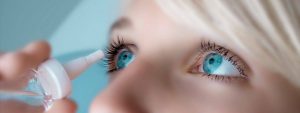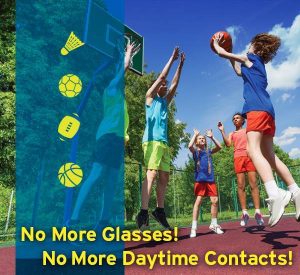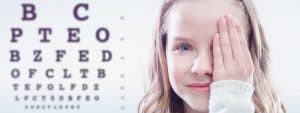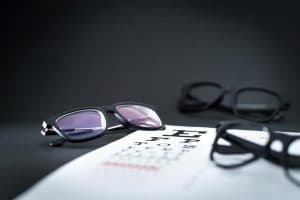Nearsighted or Farsighted?
Have you been told you are ‘nearsighted’ or ‘farsighted’ but not totally sure what they mean? Both of these may require you to rely on
Read MoreTop 5 Myopia Myths
Do you want to know the truth about the top 5 myopia myths? Myopia affects 1.45 billion people worldwide and is the most common refractive
Read MoreMyopia and Vision Therapy
Vision therapy not only treats lazy eye, eye turn, or learning difficulties, but may also prevent or slow the progression of myopia. While a cure
Read MoreWhen are Atropine Eye Drops Used?
Atropine is an essential eye drop used by eye doctors in both the diagnosis and treatment of many eye conditions. When you go for your
Read MoreMultifocal Contact Lenses for Children
Was your child prescribed multifocal contact lenses and you’re not sure why? Multifocal contact lenses are prescribed for children to support their learning and school
Read MoreWhy Are My Child’s Eyes Weakening?
Are you concerned your child’s eyes are weakening? Why does this happen? Children’s eyes can weaken and lenses become stronger, but should I be concerned?
Read MoreLASIK Eye Surgery: 5 Myths and Facts
Here’s the most common myths and facts on laser eye surgery. While LASIK eye surgery has become the most popular refractive surgery in the U.S, there are many misconceptions regarding this procedure that prevent people from even discussing LASIK with their eye doctors.
Read MoreNear Point Visual Stress (NPVS)
Modern science now understands why long hours of reading and screen time can lead to eye strain. When the visual system struggles to meet the
Read MoreWhat’s Worse: High Myopia or Smoking?
Smoking can lead to the development of sight-threatening eye diseases — but did you know that myopia can also increase your risk of these serious
Read MoreMyopia Management for Athletes
Rarely do you think about your eyes when preparing for a big game… until your glasses slip off your face or your contact lenses pop
Read MoreHow Does Ortho-K Work?
Ortho-k lenses are designed to float on top of the eye’s tear film and apply gentle water-based (hydraulic) pressure to the front layer of the cornea, called the epithelium. The hydraulic pressure causes the cells of the epithelium to move from the center of the cornea to the periphery. This migration of corneal cells leads to a temporary reshaping of the cornea and correction of the refractive error.
Read MoreOrtho-K: Top 10 FAQs
Orthokeratology (ortho-k) is quickly becoming the gold standard for myopia management in children. Here are the top 10 most frequently asked questions about ortho-k to help you decide if this myopia management technique is right for you.
Read MoreThe Benefits of Outdoor Play for Children with Myopia
Not only does spending time outdoors have significant health benefits, it can even help to slow down myopia progression in children. Myopia, more commonly known
Read MoreShould I Be Worried About Myopia?
Myopia (nearsightedness) progression in children doesn’t only result in needing stronger glasses, but also leads to serious sight-threatening eye conditions. Below are the most common
Read MoreCan Your Child Benefit from Myopia Management?
According to studies, myopia management has shown to reduce myopia progression by up to 78%. Myopia management is a treatment program that involves multifocal glasses or contact lenses, overnight ortho-k lenses, MiSight lenses, or specialized eye drops— all scientifically proven to reduce the rate of myopia progression and the risk of future eye diseases associated with myopia.
Read MoreMiSight Lenses for Myopia Management
MiSight contact lenses are daily disposable, soft contact lenses designed to control myopia progression in children ages 8 to 15 years. Although FDA approval is for children up to age 12, recent research has found that teens up to age 15 can also benefit from these lenses.
Read MoreAre Ortho-K Lenses Safe?
Ortho-k lenses are designed to reshape your cornea while you sleep, so you can benefit from clear vision during the day— without the need for glasses or contact lenses. These specialized lenses are prescribed to control the rate of myopia progression in children, as well as for vision correction without the need for daytime eyewear. The question is, are they safe?
Read MoreWhy Do Adults Choose Ortho-K?
If you have been thinking about ways to improve your vision without the need for corrective eyewear, ortho-k may be the solution you have been searching for
Read MoreWhy Is My Child’s Myopia Worsening?
Are you concerned that your child needs stronger eyeglasses? Myopia is not only blurry vision but can also lead to serious sight-threatening eye diseases. Myopia
Read MoreWhat Is Myopia?
Myopia affects clarity of vision for any distant images and objects – the board in a classroom, driving, the television, a clock on the wall, etc. Myopia affects millions of children and adults, worldwide, over 30% of the U.S. population suffers from myopia.
Read MoreWhy Is Myopia Management Important?
Is there a way to prevent my child’s myopia from worsening? A number of recent studies suggest that it may be possible to control myopia by totally stopping, or at least slowing down, its progression during childhood and teenage years. Myopia management is a treatment program aimed at controlling myopia, keeping the level of myopia as low as possible, in order to reduce your child’s risk of developing vision threatening eye diseases later in life.
Read More



















